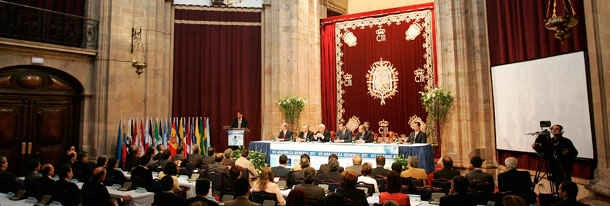The Foundation has undertaken, encouraged or collaborated in many one-off initiatives during this period as part of its objective of contributing to the social and cultural wellbeing of society.

 As part of the global concept of the Youth Group, in 1999 the Foundation instigated a series of initiatives for the school population of Asturias, with the collaboration of the Caja de Ahorros (the Savings Bank) and El Corte Inglés.
As part of the global concept of the Youth Group, in 1999 the Foundation instigated a series of initiatives for the school population of Asturias, with the collaboration of the Caja de Ahorros (the Savings Bank) and El Corte Inglés.
The aim is to help the region's youth become aware of the origin of the title of Principality, its history, and the modern day links between the Prince and his land. A yearly competition for schools, by the name of "They were once like you", also aims to inform secondary school students of the life and work of the famous people and institutions that have been given the Prince of Asturias Awards.
 Organised by the Foundation and Cajastur, a member of its Board of Trustees, Reunion in the Motherland is the culmination of a project that in December 2007 brought to Oviedo hundreds of young Asturian professionals that work outside of the Principality, collecting experience and knowledge that they now want to apply to a third-millennium Asturias. To that end, it featured the collaboration of associations and individual professionals, who work in other Spanish regions and abroad and who, because of this project, have come together under the name Asturias Commitment XXI.
Organised by the Foundation and Cajastur, a member of its Board of Trustees, Reunion in the Motherland is the culmination of a project that in December 2007 brought to Oviedo hundreds of young Asturian professionals that work outside of the Principality, collecting experience and knowledge that they now want to apply to a third-millennium Asturias. To that end, it featured the collaboration of associations and individual professionals, who work in other Spanish regions and abroad and who, because of this project, have come together under the name Asturias Commitment XXI.
In 1990 the Foundation took the initiative to help establish the prestigious Soviet Chamber Orchestra "The Moscow Virtuosi", along with its conductor, the internationally acclaimed violinist Vladimir Spivakov and six music professors, in Asturias. After three years of working within a collaboration agreement in which other institutions and bodies took part, the thirty members of "The Moscow Virtuosi" offered their art to Spain, frequently collaborating with our choirs. Its professors undertook to give classes in Asturias, promoting the noble art of music.
Upon expiration of the agreement in 1993, the orchestra (its members and their families, the instructors, and a luthier teaching his craft) established their permanent residence in the Principality, from where they carry out their world tours, make their recordings with the multinational corporation RCA, and, at the same time, continue their frequent collaborations with the Foundation's Musical Area. All of these factors ensure the continuity of the objectives that the Foundation had marked out when it brought The Moscow Virtuosi to Asturias to Asturias: to encourage the appreciation of music in the region and to improve the quality of teaching in the Principality's conservatories.
Since its creation, the Foundation has contributed to, sponsored and/or organised several international conferences, including that ofthe Theory and Methodology of Science (April 1982, organised by the Asturian Society of Philosophy), those of the Ibero-American Federation of Journalists (July 1982) and the Association of European Journalists (October 1982), as well as various exhibitions, an international debate on "The Crisis in Europe Twenty Years after the Treaty of Rome", several university courses and aid to other projects aimed at the conservation of cultural heritage, artistic, musical and editorial initiatives.
The Foundation itself has likewise organised two international scientific symposia of major impact:"The Origins of Life", in honour of the Asturian Nobel Prize-winner Severo Ochoa (June 1990), and "Nutrition and Health", also in honour of the eminent scientist Francisco Grande Covián (November 1991).
In 1995, the Foundation contributed to the celebration of the 1st International Conference on Protocol, held in Oviedo under the honorary presidency of HRH the Prince of Asturias and organised around Mr Felio A. Vilarrubias, Head of Protocol at the Foundation.Also in 1996, the Foundation partially funded -in a joint contribution with the regional savings bank Caja de Asturias- the 2nd International Symposium on Problems in Quantum Physics, held in Oviedo.
Under the collaboration agreement with Caja de Asturias, work began in 1993 on what was to be a Music Archives of Asturias, aimed at locating, collecting and centralising the broadest range of documents on Asturian music, whatever their origin and source.The objectives of these archives are the recovery of the musical material generated in the region, the upkeep of this collection, the researching of the musical heritage of Asturias, the creation of a census of the Principality'smusical resources and, eventually, the dissemination of these resources in their entirety.In 1995, an exhibition was held at the Palacio de Toreno,in Oviedo, with the first fruits of the work carried out, which was opened by HRH the Prince of Asturias.
These archives now have their own document database, "MUSICAE", containing more than 10,000 records, and have issued two catalogues:one of Asturian discography and another of Asturian composers.
An agreement was signed in 1996 between the two institutions and the Regional Ministry of Culture in Oviedo, under which said Ministry was to provide premises for the Archives as well as their maintenance costs, for which it would become fully responsibility in two years (in 1998). Meanwhile, the Foundation was to provide a maximum of one hundred twenty thousand euros per year (from the two hundred forty thousand euros Caja de Asturias receives for "Collaborative Activities") to cover its operating costs and activities during this period.
Our Foundation is a founding member of the Asturian Fundación Oso, the honorary president of which is HM King Felipe VI, and whose CEO was Mr Martin Gonzalez del Valle, also a member of the Boards of Trustees of the Foundation.
In accordance with its Founding Charter, the President of the Foundation is a member of the Board of Trustees of the Fundación Oso.
Legacy bequeathed by Mr Justo Montoto Arias.
In October 1991 and September 1992, the Foundation organised two exhibitions showing part of the philatelic legacy from Mr Justo Montoto Arias, who bequeathed it to the Foundationin his will.This collection has been valued by experts at 360,000 thousand euros and was bequeathed to our institution after the death of Mr Justo Montoto Arias (as stipulated by him in his will ten years before his death).
This collection, considered by experts to be exceptional, contains around 60,000 base stamps, enhanced with magnificent varieties, errors and proofs to sum nearly one hundred thousand specimens in several collections:Spain and its colonies, the Vatican, United States, United Nations, Panama, Olympics, etc.
The two exhibitions that were organised offered an overview of the entire collection (the first) and a sample of the Olympic collections of the legacy (the second).
A series of conferences were held in 1993 and 1994, under the title “Meetings in Asturias:Prince of Asturias Award Juries”, in which some of the most prominent members of our awards juries gave talks at various locations in the region.
At the request of Gijón City Council, the Foundation actively participated in the cultural project "Astvres: peoples and cultures on the frontier of the Roman Empire", opened by HM the Queen on 7th March 1995, and organised since the previous year by a joint venture constituted by Gijón City Council, the Regional Government of the Principality of Asturias and Caja de Asturias, with the collaboration of the University of Oviedo and our Foundation and under the auspices of UNESCO.
The Foundation was responsible, in particular, for various phases of itssetting up and cededits press and documentation service to the "Astures" organisation.
The exhibition, which remained open until September, received more than 114,000 visitors at its five different venues, which hosted an extraordinary example of how the Asturespeople lived in a border zone of the Roman Empire, and how Rome itself transformed the lifestyles of these people, who later became integrated in classical culture.
The work of the Institutodel Campo was carried out within the framework of the Foundation for nearly a decade.During the years it operated under the able leadership of Jesus Gayol, the Foundation fostered the development of the Asturian countryside through the Institute, promoting the introduction in the Principality of new crops (horticulture, mushrooms and others), beekeeping, etc., leading their rationalization, the creation of cooperatives and the adoption of other initiatives to improve the quality of life in rural areas.Several thousand families benefited from the work and advice of the technical specialists who worked at the Institute.
